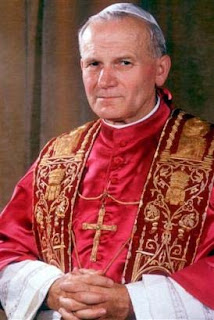 In the Christian world, a truly prestigious culture has flourished throughout the centuries, as much in the area of literature and philosophy as in the sciences and the arts. The very concept of beauty in ancient Europe is largely the result of the Christian culture of its peoples, and its landscape reflects this inspiration. The centre around which this culture has developed is the heart of our faith, the eucharistic mystery. Cathedrals, humble country churches, religious music, architecture, sculpture and painting all radiate the mystery of the verum Corpus, natum de Maria Virgine, towards which everything converges in a movement of wonder. As for music, I am glad to commemorate Giovanni Pierluigi da Palestrina this year, on the occasion of the fourth centenary of his death. It would seem that, after a troubled period, the Church regained a voice made peaceful through contemplation of the Eucharistic mystery, like the calm breathing of a soul that knows it is loved by God.
In the Christian world, a truly prestigious culture has flourished throughout the centuries, as much in the area of literature and philosophy as in the sciences and the arts. The very concept of beauty in ancient Europe is largely the result of the Christian culture of its peoples, and its landscape reflects this inspiration. The centre around which this culture has developed is the heart of our faith, the eucharistic mystery. Cathedrals, humble country churches, religious music, architecture, sculpture and painting all radiate the mystery of the verum Corpus, natum de Maria Virgine, towards which everything converges in a movement of wonder. As for music, I am glad to commemorate Giovanni Pierluigi da Palestrina this year, on the occasion of the fourth centenary of his death. It would seem that, after a troubled period, the Church regained a voice made peaceful through contemplation of the Eucharistic mystery, like the calm breathing of a soul that knows it is loved by God.
Christian culture admirably reflects man’s relationship with God, made new in the redemption. It opens us to the contemplation of the Lord, true God and true man. This culture is enhanced by the love that Christ pours into our hearts (cf. Rom 5:5) and by the experience of disciples called to emulate their Master. Such sources have given rise to an intense awareness of the meaning of life, a strength of character that blossoms in the heart of Christian families and a sense of finesse unknown in the past. Grace awakens, frees, purifies, orders and expands the creative powers of man. While it invites asceticism and renunciation, it does so in order to free the heart, a freedom eminently conducive to artistic creation as well as to thought and action based on truth.
In this culture, therefore, the influence of the saints is decisive: through the light that they emanate, through their inner freedom, through the power of their personality, they have made a mark on the artistic thought and expression of entire periods of our history. It is enough to mention St. Francis of Assisi. He had a poet’s temperament, something which is amply confirmed by his words, his attitude, his innate sense of symbolic gesture. Although his concerns were far removed from the world of literature, he was, nevertheless, the creator of a new culture, both in thought and in art. A St Bonaventure or a Giotto could not have developed had it not been for him.
This, dear friends, is where the true requirements of Christian culture dwell.
Pope John Paul II










